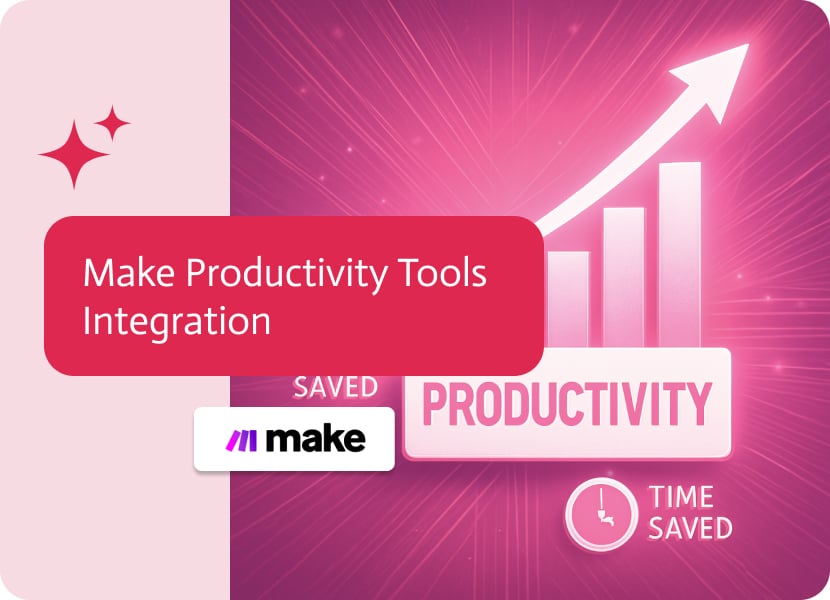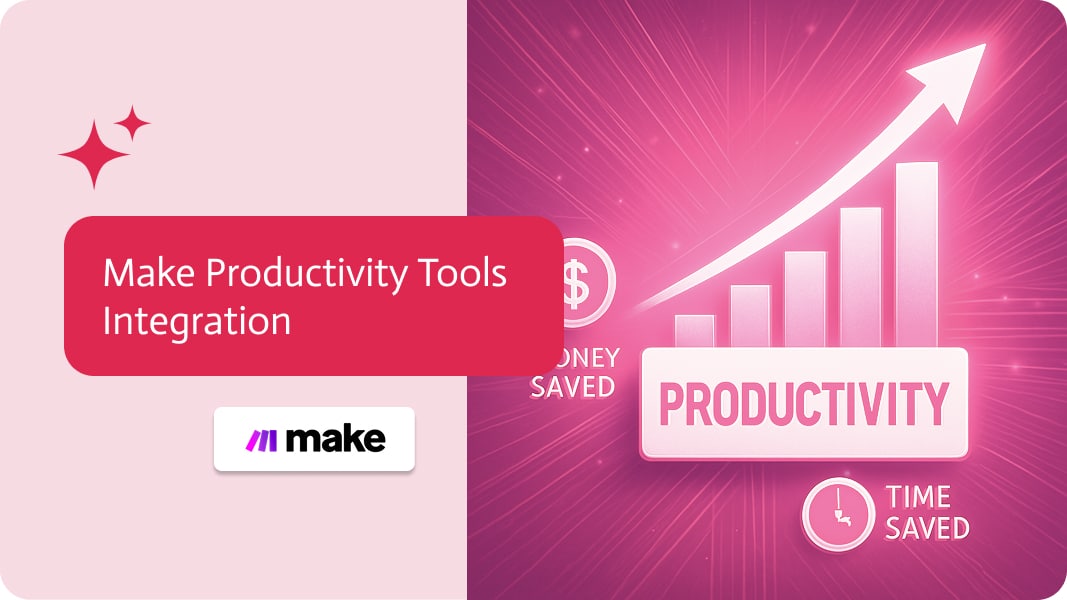

Make Productivity Tools Integration
In today’s digital workplace, productivity tools integration is crucial for small businesses and non-profits. Make, formerly Integromat, Productivity Tools Integration offers a user-friendly platform to connect various applications. This article explores how Make Productivity Tools Integration can boost efficiency for organizations with limited resources.
Top Use Cases for Make Productivity Tools Integration
1. Streamlining Project Management
Small teams benefit greatly from integrated project management tools.
Use Case: Connecting project platforms with communication tools
Example: Make integrates Trello with Slack and a Time tracking app. This allows real-time notifications about tasks and updates in Slack channels.
Benefits:
- Better communication
- Increased task visibility
- Quicker responses to changes
Make’s Productivity Tools Integration visual interface simplifies complex integrations. By linking project tools with time tracking apps, small organizations gain valuable insights into task durations. This integration can also automate status updates, reducing manual reporting. For instance, when a task’s status changes in Trello, Make can automatically post an update in the relevant Slack channel. This keeps everyone informed without extra effort, which is particularly valuable for small teams wearing multiple hats.
2. Enhancing File Collaboration
Seamless file sharing is essential, especially for remote teams.
Use Case: Linking cloud storage with communication platforms
Example: Make connects Google Drive to communication platforms.
Benefits:
- Easier file access
- Better version control
- More efficient editing
Make also integrates file tools with communication platforms. This improves review processes and speeds up decision-making. For example, Make can automatically notify team members in Slack when a shared document is updated in Google Drive. It can even create tasks in project management tools when new files are added to specific folders. This level of automation ensures that important documents are never overlooked, which is crucial for small organizations managing multiple projects simultaneously.
3. Synchronizing Notes Across Platforms
Effective note-taking boosts creativity in small teams.
Use Case: Syncing different note-taking apps
Example: Make’s Productivity Tools Integration facilitates integration between Evernote and OneNote. Users can access notes on either platform.
Benefits:
- Improved note accessibility
- Better cross-platform compatibility
- Reduced information loss
Make can also connect note apps with mind mapping tools. This helps teams visualize ideas, especially useful for complex projects. Furthermore, Make can automate the organization of notes based on tags or content. For instance, it can automatically create to-do items in a task management app when notes are tagged with “action item”. This ensures that ideas captured during brainstorming sessions are translated into actionable tasks, increasing productivity for small teams.
4. Improving Customer Relationship Management
Integrated CRM systems enhance customer service for small organizations.
Use Case: Linking CRM with communication tools
Example: Make integrates Salesforce with Gmail. Sales teams can access customer data directly from their email.
Benefits:
- Better customer data access
- More personalized interactions
- Streamlined sales processes
Make can also connect CRM with Email providers. This provides a complete view of customer interactions across channels. Additionally, Make can automate lead nurturing processes. For example, it can create follow-up tasks in the CRM when a prospect opens an email. This level of automation allows small businesses to provide personalized attention to a larger number of leads, effectively scaling their sales efforts without increasing staff.
5. Optimizing Time Tracking
Accurate time tracking is vital for project management and billing.
Use Case: Connecting time tracking with project and billing software
Example: Make’s Productivity Tools Integration links Toggl, Asana, and QuickBooks. This allows seamless time tracking, timeline updates, and invoice generation.
Benefits:
- Better project time estimation
- More accurate billing
- Improved resource allocation
Make’s time tracking integration can also automate HR and payroll processes. This saves significant administrative time for small teams. Moreover, Make can generate custom reports by pulling data from multiple sources. For instance, it can create weekly productivity reports by combining time tracking data with project progress information. These insights help small organizations optimize their resource allocation and improve overall efficiency.
6. Facilitating Team Communication
Effective communication is crucial for small organizations where every role is vital.
Use Case: Integrating messaging with task management
Example: Make connects Microsoft Teams with Jira. Team members can manage tasks directly from their chat interface.
Benefits:
- Less time switching between apps
- Better task tracking
- Enhanced team collaboration
Furthermore, Make can automate routine communication tasks. For example, it can send daily project status updates to relevant team channels or schedule recurring team meetings based on project milestones. This automation ensures consistent communication without burdening team members, allowing small organizations to maintain clear lines of communication even as they scale.
Conclusion: Make’s Impact on Small Organizations
Make offers powerful integration capabilities tailored for small businesses and non-profits. By connecting various apps through Make, these organizations can:
- Reduce manual tasks
- Improve information flow
- Gain operational insights
- Maximize limited resources
While Make is great for small businesses and non-profits (another good option for these organizations is Zapier), larger organizations might need more robust and scalable integration platforms. Noca AI offers AI-driven, no-code solutions tailored for enterprise needs. Similarly, MuleSoft excels in API management and complex integrations. On the other hand, Workato combines integration with automation, making it a strong choice for large-scale operations. These platforms provide the scalability and advanced features necessary for handling the demands of bigger enterprises.
To successfully implement Make, small businesses and non-profits should:
- Identify workflow pain points
- Explore integration options
- Prioritize high-impact integrations
- Train employees on the new systems
- Regularly review and optimize integrations
By leveraging Make’s capabilities, small businesses and non-profits can boost efficiency and success. Even with limited resources, they can thrive in the digital workplace through smart integration strategies.


